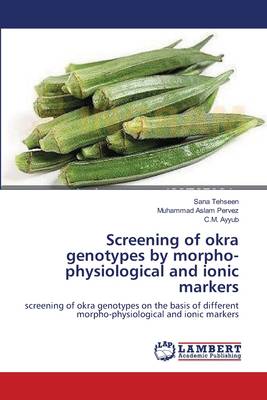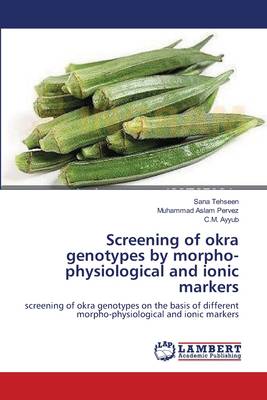
Je cadeautjes zeker op tijd in huis hebben voor de feestdagen? Kom langs in onze winkels en vind het perfecte geschenk!
- Afhalen na 1 uur in een winkel met voorraad
- Gratis thuislevering in België vanaf € 30
- Ruim aanbod met 7 miljoen producten
Je cadeautjes zeker op tijd in huis hebben voor de feestdagen? Kom langs in onze winkels en vind het perfecte geschenk!
- Afhalen na 1 uur in een winkel met voorraad
- Gratis thuislevering in België vanaf € 30
- Ruim aanbod met 7 miljoen producten
Zoeken
Screening of okra genotypes by morpho-physiological and ionic markers
screening of okra genotypes on the basis of different morpho-physiological and ionic markers
Sana Tehseen, Muhammad Aslam Pervez, C. M. Ayyub
Paperback | Engels
€ 63,45
+ 126 punten
Omschrijving
Excessive accumulation of soluble salts in soil suppresses plant growth and productivity so an efficient and simple screening technique for selection of available okra (Abelmoschus esculentus L.) genotypes for salt tolerance was executed. Seeds of eight okra genotypes were grown in pot culture under protected environment of lath house. Twenty days old seedlings were exposed to salinity under control, 20, 40, 60 and 80 mM NaCl. Results revealed that increasing salinity caused reduction in plant height, number of leaves, fresh and dry weights as well as gas exchange characteristics like photosynthesis rate and stomatal conductance of okra. Na contents were higher in salt sensitive genotypes as compared to tolerant one. Okra genotypes OH-2324 and OH-597 spectacled best performance in all the measured parameters and grouped under salt tolerant cultivars while OH-152 and OH-809 were aggravated in maintaining normal functioning at higher salinity levels thus proved to be salt sensitive.
Specificaties
Betrokkenen
- Auteur(s):
- Uitgeverij:
Inhoud
- Aantal bladzijden:
- 100
- Taal:
- Engels
Eigenschappen
- Productcode (EAN):
- 9783659105586
- Verschijningsdatum:
- 5/05/2012
- Uitvoering:
- Paperback
- Afmetingen:
- 152 mm x 220 mm
- Gewicht:
- 159 g

Alleen bij Standaard Boekhandel
+ 126 punten op je klantenkaart van Standaard Boekhandel
Beoordelingen
We publiceren alleen reviews die voldoen aan de voorwaarden voor reviews. Bekijk onze voorwaarden voor reviews.









